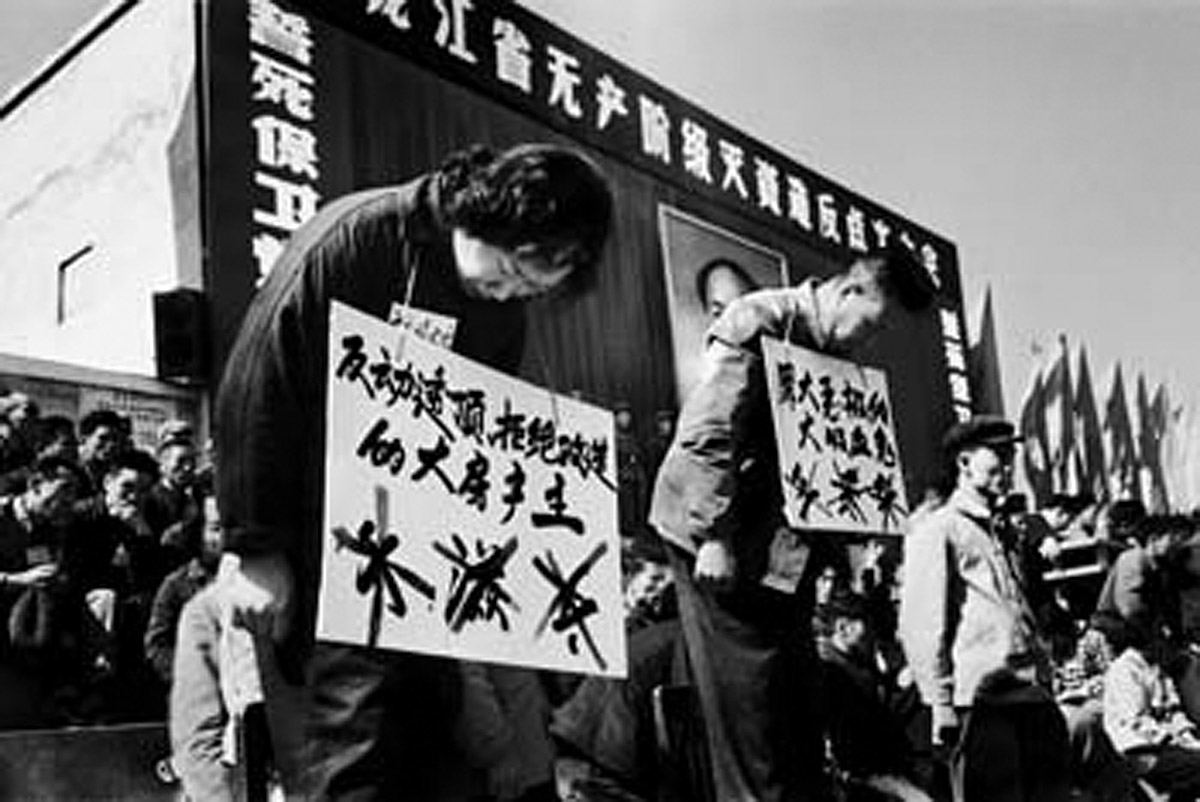不要忘記文革的本質
◎
金鐘

●
文革初期黑龍江省召開大型批鬥「牛鬼蛇神」大會。(李振盛)
繼四月號、五月號紀念文革的專題之後,本刊再推出這個《文革透視》專題,有訪問,有特約文章,也有大陸學者作家的來稿。這三個專題,從西藏文革的個案剖析到對文革的回憶,現在我們將接觸到文革的本質。知名的文革研究者王友琴女士的文章一針見血地指出,文革是一場反人類的群體滅絕罪行,是一場大規模的預謀殺人運動,導致數以百萬計的民眾死亡。在人權至上的價值體系中,王友琴對文革性質的界定,應該是文革研究中最重要的課題。也是文革之惡的維護者——中共當局極力封殺文革歷史的根本原因。
在文革過去 30-40 年的今天,我們看到,一方面由於中共的封殺,包括對文革檔案與資訊的封鎖、對文革真相的扭曲,尤其是對文革元兇毛澤東的不斷美化,在中國大陸造成歷史的斷層和不止一代人對文革的無知與遺忘。另一方面在西方社會,雖然有越來越多的人在研究和逐漸明了文革的真相,但仍然有相當多的人包括若干學者,對文革處於盲目幼稚的認知狀態,甚至跳不出中共宣傳的框架,迷信毛派「革命」的理想主義和浪漫主義,無視中國人民在毛獨裁統治下遭受的巨大苦難與犧牲,也有一些人在學術的微觀領域糾纏不休。因此,總體而言,「文革研究在西方」的狀況,在紀念文革 40 年時,仍然沒有根本的改變,因而,文革研究的局限性也就難以避免。新聞熱潮過去後,我們一如既往,將繼續發表有關文革的文章,也歡迎探討一些有爭議的重大問題。
We Must Not Forget the Nature of the Cultural Revolution
By Jin Zhong, Chief Editor
After presenting you with Special Topics in both the April and May issues commemorating China 's Cultural Revolution, in this issue we present another Special Topic offering various perspectives on this disaster in the form of interviews, articles by invited guests, and contributions from mainland scholars and writers. Ranging from an analysis of individual victims in Tibet to personal memories of the Cultural Revolution, these three Special Topics taken together enable us to delve into the very nature of the Cultural Revolution itself.
In this issue, Dr. Wang Youqin, a well-known researcher of the Cultural Revolution, goes straight to the heart of the matter by pointing out that the Cultural Revolution is a crime against humanity in the form of mass genocide – a large-scale movement of premeditated murder causing the deaths of millions of civilians. In a value system that places human rights over everything else, Dr. Wang's delineation of the nature of the Cultural Revolution should be made the most important topic of Cultural Revolution study. It is the very reason that those who defend the evils of the Cultural Revolution, namely the Communist authorities, have been desperately trying to suppress the history of the Cultural Revolution.
Some 30-40 years after the Cultural Revolution, we now see that the Communist regime's suppression, including the sealing off of Cultural Revolution files and materials, has distorted the real picture, in particular relentlessly polishing the image of Mao Zedong, chief culprit of the Cultural Revolution, to create a historical fault line of ignorance and amnesia among the succeeding generations of mainland China.
At the same time, in the Western world, although more people have carried out research that has led them to gradually understand the real picture, there are still many, including some scholars, who remain in a cognitive state of ignorance and naivety, unable to break through the propaganda framework of the Chinese Communists, and maintaining their blind faith in the “revolutionary” idealism and romanticism of Maoists while ignoring the tremendous sufferings and sacrifices of the Chinese people under Mao's dictatorial rule. There are also westerners entangled in microscopic regimes of academic research who lack a macro vision of historical and international proportions.
The overall result is that upon this anniversary of the launch of the Cultural Revolution, the situation of “Cultural Revolution research” in the West has not changed fundamentally, and continues to suffer from limitations. After the present flood of media stories commemorating the Cultural Revolution's anniversary inevitably subsides, this magazine will continue to publish articles about the Cultural Revolution and welcome further exploration of this important and controversial chapter in the history of modern China .


